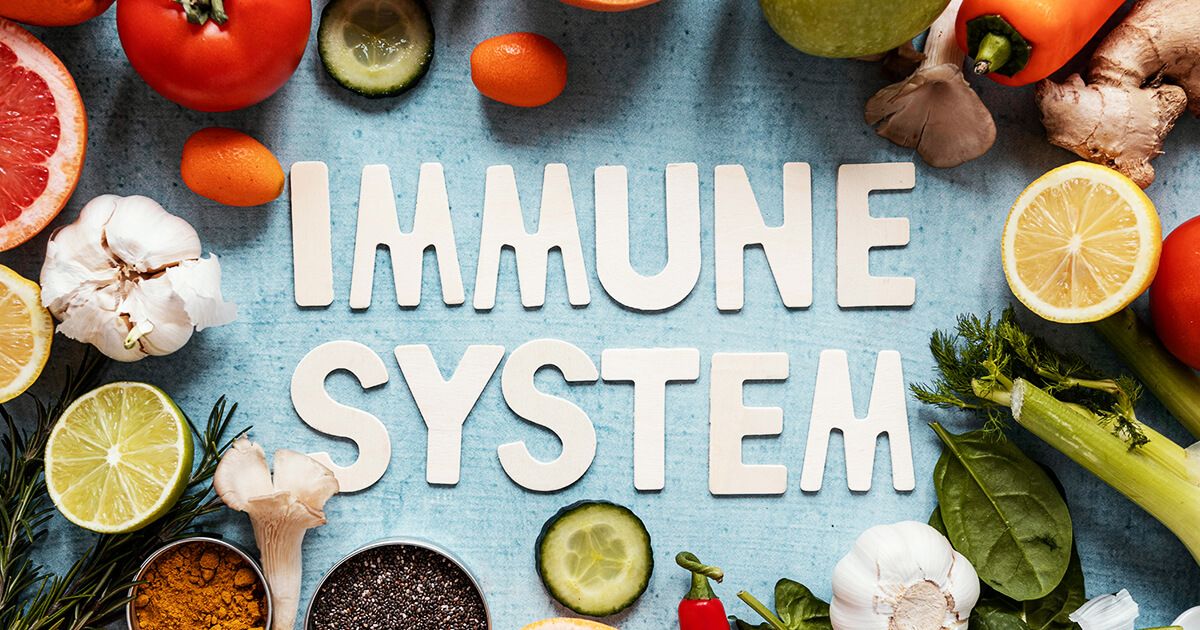Blog
The Connection Between Nutrition and Immunity

Did you know that what you eat can have a profound impact on your body's ability to fight off illnesses and infections?
Imagine having the power to strengthen your immune system and shield your body from diseases, all through the choices you make at the dinner table.
The immune system is your body's natural defense mechanism against pathogens like viruses and bacteria, and it plays a critical role in keeping us healthy. Proper nutrition is a key factor in supporting and enhancing the immune system's function.
In this blog post, we will explore the intricate relationship between nutrition and immunity. We'll look into the essential nutrients that boost immune function, discuss immunity-boosting foods, reveal lifestyle factors that impact your body's defenses, and offer practical tips for optimizing your immune health.
As always, our team at Cook’s RX is here to help you in your health journey. You do not have to navigate this part of your life alone. If you’re still unsure about how to focus on your immunity, nutrition or anything else related to healthy living, reach out to us and we will help you out.
The Impact of Nutrition on Immunity
Nutrition helps support immune function by providing the essential vitamins, minerals, and antioxidants that help regulate and strengthen the body's defense mechanisms, enabling it to effectively combat infections and diseases.
Nutrient deficiencies can significantly weaken immunity, leaving the body vulnerable to illnesses. Inadequate intake of key nutrients like vitamin C, vitamin D, zinc, and others can compromise the immune system's ability to ward off threats, making it imperative to maintain a well-balanced diet for optimal immune health.
The Gut-Immunity Connection
The gut and the immune system are intricately connected, with approximately 70% of immune cells residing in the gut-associated lymphoid tissue (GALT). A healthy gut provides a barrier against harmful pathogens by maintaining the balance of beneficial and harmful bacteria in the digestive tract.
This balance, known as gut microbiota, is vital in training and modulating the immune system. It helps the immune system distinguish between harmless substances and potential threats.
When the gut is in good shape, it can effectively support the immune system in recognizing and responding to pathogens, ultimately contributing to a stronger immune response.
Probiotics are beneficial bacteria that can be consumed through foods like yogurt, kefir, and supplements. They help maintain a healthy gut microbiome by promoting the growth of beneficial microorganisms. Probiotics can enhance the gut's ability to regulate the immune system and reduce inflammation, which is essential for overall immune health.
Prebiotics are dietary fibers that serve as food for probiotics and beneficial gut bacteria. They can be found in foods like garlic, onions, asparagus, and bananas.
Key Nutrients for Immune Health
Understanding the key nutrients for immune health is very important in bolstering your body's defences. These essential vitamins, minerals, and antioxidants form the foundation of a robust immune system. Here are a few to keep in mind when planning out your meals.

Vitamins
Vitamin C: Known for its antioxidant properties, vitamin C helps stimulate the production of white blood cells and antibodies, enhancing the body's ability to fight infections.
Vitamin D: Essential for regulating immune cell function and reducing inflammation, vitamin D deficiency has been linked to increased susceptibility to respiratory infections.
Vitamin E: A powerful antioxidant that protects cell membranes, vitamin E supports immune cell function and helps maintain the integrity of the immune system.
Minerals
Zinc: Zinc is key to the development and function of immune cells. Zinc deficiency can impair the body's ability to combat infections effectively.
Selenium: As an antioxidant, selenium helps regulate immune responses and can enhance the body's defenses against certain viruses.
Antioxidants
Antioxidants, including vitamins C and E, as well as minerals like selenium, help neutralize harmful free radicals in the body, reducing oxidative stress and inflammation that can weaken the immune system. By scavenging free radicals, antioxidants support immune cells in their fight against pathogens, contributing to overall immune health.
Immunity-Boosting Foods
There is a vibrant world of culinary choices available as we explore immunity-boosting foods that not only tantalize your taste buds but also fortify your body's natural defenses against illnesses and infections.
Here are some foods rich in immune-boosting nutrients for you to keep in mind:
Citrus Fruits: Oranges, lemons, and grapefruits are packed with vitamin C, which stimulates the production of white blood cells and antibodies.
Berries: Blueberries, strawberries, and raspberries are rich in antioxidants that help reduce oxidative stress and support overall immune health.
Leafy Greens: Spinach, kale, and broccoli provide essential vitamins like A and C, along with minerals like zinc, that are crucial in immune function.
Garlic: Known for its immune-boosting properties, garlic contains allicin, a compound that can enhance the activity of immune cells.
Yogurt: Probiotic-rich foods like yogurt promote a healthy gut microbiome, which is closely linked to a strong immune system.
Nuts and Seeds: Almonds, sunflower seeds, and walnuts offer vitamin E and healthy fats that contribute to immune health.
Lean Protein: Chicken, turkey, and fish are sources of protein and amino acids necessary for immune cell production.
Ginger and Turmeric: These spices possess anti-inflammatory properties that can help modulate immune responses.
Lifestyle Factors and Immunity
Lifestyle factors have a profound impact on immunity. In this section, let’s look at the role that sleep, exercise, and stress management play in nurturing a resilient immune system.
Sleep: Adequate sleep is essential for the body to rest, repair, and recharge. The immune system becomes more active during deep sleep, producing cytokines and antibodies that help combat infections.
Exercise: Regular physical activity boosts circulation and helps immune cells move freely throughout the body. Exercise also reduces inflammation, enhancing the body's ability to respond to pathogens.
Stress Management: Chronic stress can weaken the immune system, making it less effective at fighting off infections. High stress levels can lead to the release of stress hormones like cortisol, which can suppress immune function.
Now that we understand the importance of these lifestyle factors, let’s aim to incorporate the following healthy habits into your lifestyle.
Prioritize Sleep: Aim for 7-9 hours of quality sleep per night. Create a bedtime routine, keep a consistent sleep schedule, and create a comfortable sleep environment.
Stay Active: Engage in regular physical activity, such as walking, jogging, or yoga, to promote circulation and immune cell activity. Aim for at least 150 minutes of moderate-intensity exercise per week.
Manage Stress: Practice stress-reduction techniques like mindfulness meditation, deep breathing exercises, or yoga. Allocate time for relaxation and self-care.
Maintain a Balanced Diet: Continue to emphasize the importance of a well-balanced diet rich in immune-boosting nutrients. Consume a variety of fruits, vegetables, lean proteins, and whole grains.
Stay Hydrated: Proper hydration is essential for overall health and can help support the immune system by facilitating the movement of nutrients and immune cells throughout the body.
Limit Alcohol and Smoking: Excessive alcohol consumption and smoking can weaken the immune system. Encourage moderation or quitting these habits if applicable.

Immunity-Boosting Supplements
Supplements can play a valuable role in supporting immune health by providing essential nutrients that may be lacking in one's diet. They can help bridge nutritional gaps, particularly when it's challenging to obtain sufficient nutrients from food alone, ensuring the body has the necessary building blocks for a robust immune response.
It's essential to exercise caution when using supplements, as excessive intake can sometimes be harmful. Individuals should consult with a healthcare professional or registered dietitian to determine their specific nutrient needs and choose supplements wisely to avoid potential interactions or side effects.
As always, our team at Cook’s RX is here to help you in your health journey. You do not have to navigate this part of your life alone. If you’re still unsure about how to focus on your immunity, nutrition or anything else related to healthy living, reach out to us and we will help you out.
Any medical or pharmaceutical information on this site is provided as an information resource only and is not to be used or relied on for any diagnostic or treatment purposes. This information does not create any patient-pharmacist relationship, and should not be used as a substitute for professional diagnosis and treatment.
Please consult your healthcare provider before making any healthcare decisions or for guidance about a specific medical condition.
Cook’s Pharmacy and its subsidiaries expressly disclaim responsibility and shall have no liability, for any damages, loss, injury, or liability whatsoever suffered as a result of your reliance on the information contained in this site.
Contributors
Latest Posts
Show All Recent Posts
Archive
-
2025
-
May
-
April
-
March
-
February
-
January
-
-
2024
-
December
-
November
-
October
-
September
-
August
-
July
-
June
-
May
-
April
-
March
-
February
-
January
-
-
2023
-
December
-
November
-
October
-
September
-
August
-
May
-
April
-
March
-
February
-
January
-
-
2022
-
December
-
November
-
October
-
September
-
August
-
July
-
June
-
May
-
April
-
February
-
